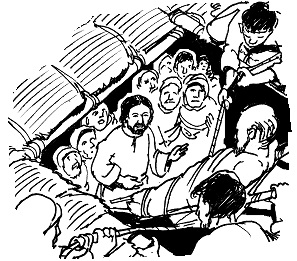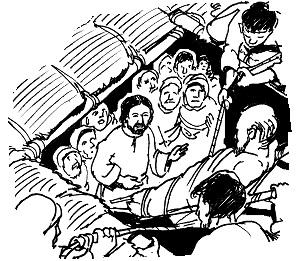

“Who but God alone can forgive sins?” (Mark 2:6).
1 Sam 8:4-7, 10-22; Mark 2:1-12
Mark is the shortest of the four Gospels, and in style and structure he is the most economical wordsmith. Yet he affords space and great detail for the story of the paralytic Jesus forgives and then heals. We can only conclude that Mark wanted the message of this story to be noted early on in his Gospel. Besides being a dramatic story about four friends carrying and lowering the paralytic through the roof for a spectacular miracle, it is also a conflict story between Jesus and his critics, who murmur loudly when he first tells the man that his sins are forgiven.
Blind to the power Jesus has exhibited in healing numerous people, the scribes in the crowd consider only the theological issue of whether anyone except God can forgive sins. In fact, they and the temple priests have set themselves up as mediators between people and God by defining what was a sin and proscribing rituals and sacrifices to atone for sin. If anyone could forgive sins, these professional clergy would lose their exclusive and often lucrative role as God’s gatekeepers and judges.
Jesus observes the interaction in the crowd as the paralytic is let down on ropes through a space in the ceiling cleared of tiles. He sees the love and concern of those who carried victim to the place, worked their way through the large crowd, then devised a bold way to be sure their paralyzed friend was presented to be healed. Whatever the cause of the man’s paralysis, he is beloved by others, and Jesus affirms the power of this kind of love to heal.
Jesus answers the unspoken objections of the scribes by claiming that the “son of man” can forgive sins. This expression is found in the Book of Daniel to identify a special agent of God, but it was also a colloquial term for “human being,” In other words, people have the power to forgive, and, in fact, most sins are between people—hurt inflicted by word, deed and omission that damages families, communities, disrupts social bonds and sows enmity that can only be healed by people forgiving one another.
Directing social and personal sin to God or through an official representative of God excuses people from doing the hard part of forgiveness, the face-to-face acknowledging of harm and the humiliation of asking for mercy. Pay a fine instead, say a penance, light a candle, get absolution, and never have to address the actual fault and its effects.
In the end, the paralyzed man is healed. The invisible knots in his soul that have bound him up are untied. He stands up, picks up his life and walks home, reconciled and set free by love. The scribes are furious. The crowds are astounded, and they say what we would say if we had been loved in so gracious a way by both God and the people closest to us: “We have never seen anything like this!”
Advertisement








